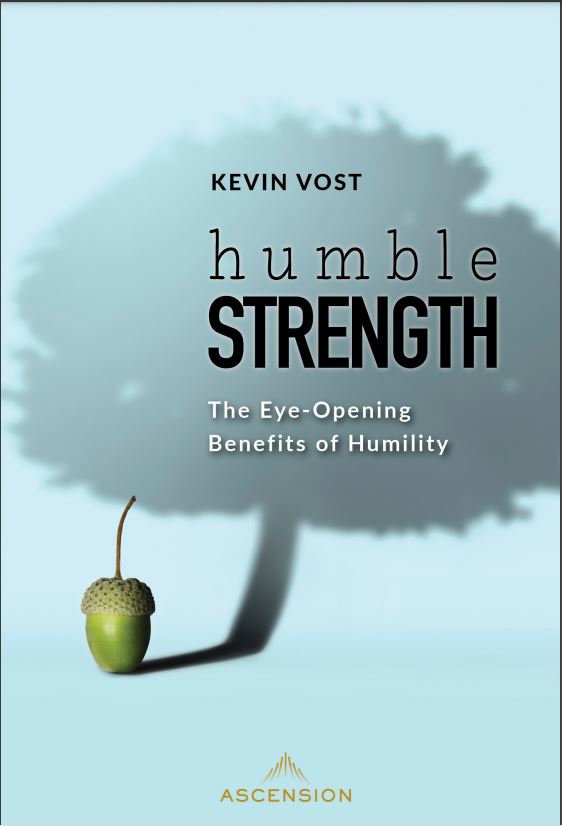Kevin Vost was raised Catholic but spent 25 years in an atheistic wilderness until he encountered the writings of St. Thomas Aquinas and re-embraced Christ and his Church. After obtaining his doctorate in clinical psychology, he taught psychology and gerontology and went on to write over 20 Catholic books. A husband, father and grandfather, he lives in Springfield, Illinois, where he spoke to Aleteia about his journey of faith and his latest book, Humble Strength: The Eye-opening Benefits of Humility.
Aleteia: As a former atheist, how has humility played a role in your spiritual life?
Dr. Kevin Vost: Humility is closely tied to truth. It leads us to an honest assessment of ourselves and where we stand in the universe. I became an atheist in my late teens because I read what seemed like airtight atheistic arguments against the existence of God, declaring that the idea of God was self-contradictory or that God was not necessary and the universe itself is the starting point without need for explanation. I thought at the time I had discovered the truth about belief in God. I sadly (and erroneously!) gave up my belief in God for the next 25 years, but He kept me seeking for the truth, until the day I came to realize that He indeed is Truth.
I wanted to believe in God, but didn’t think I could honestly do so, until I came across the writings of St. Thomas Aquinas in his Summa Theologica. There I found that the arguments of atheists had been soundly routed more than 700 years ago, and were a part of Church teaching, though I never had a clue.
Since I came back to the Church in 2004 I’ve immersed myself in the wisdom of Thomas Aquinas, who wrote about everything – including the vital importance of humility. It encouraged me to face up to the fact that I had been so wrong about something so important for a quarter of a century.

Why is humility the foundation of all virtues?
Humility, deriving from the Latin word humus for the earth or soil, recognizes that we are from the earth, “ashes to ashes, dust to dust.” It recognizes that the very fact that we exist depends not upon us but upon God. In that sense we are lowly indeed, lowliness being a synonym for humility. And yet, that is not the end of the story.
The virtue of humility does not keep us small, but sets the stage for full development of all the natural and supernatural powers God gives us. Through humility, we recognize our need for God and call upon Him for the graces that will allow us to grow, flower, and bear fruit.
Humility recognizes our weaknesses, but also our potential for great strengths. Theologians have graphically depicted humility as the foundation stone for a temple of the virtues resting upon the rock of Christ, since every kind of virtue depends upon humility. Further, we will not seek to grow in virtue unless we realize we have a long way to go – with God’s help!
How can being humble heal relationships and divisions?
The more we lack in humility, the more we focus upon our own wants and needs and the less we focus upon the wants and needs of others.
At even the level of the simplest daily interactions we have with acquaintances or complete strangers, humility has a role to play. When we share eye contact, a smile, a simple hello, or a brief compliment or comment, we remove our gaze from our own selves, recognize Christ in other people, and show that they are important to us. In such cases, humility unleashes the simple virtue of affability or friendliness we owe to everyone.
In terms of deeper relationships, be it with close co-workers, friends, or family, one simple healing act that can flow from humility is that of not dominating conversations, giving others roughly equal time to speak, and listening (rather than preparing one’s next comment) while the other speaks.
Another way to heal relationships and resolve divisions is by cultivating intellectual humility, never pretending we know what we don’t know and always being open to learning from others. This kind of humility is dearly needed in our modern world where more and more people seem to think it best to silence people with opposing views rather than striving to understand why they think as they do.
How can humility keep us from falling into temptation and sin?
Pride is usually considered the chief of the seven deadly sins, and some great theologians like Pope St. Gregory the Great and Thomas Aquinas substitute vainglory for pride in their list of seven (the others being greed, envy, wrath, lust, gluttony, and sloth or acedia). They do this because they see pride as even more fundamental than the other deadly sins, with the potential to give rise all seven and to all manner of other sins.
They used the Latin superbia for pride, which means thinking and acting as if one were over or above what one truly is. In Lucifer’s great sin of pride, he sought to be more than he was and like unto God, gloriously made though he was. Humility, on the contrary, prompts us to think and act as we truly are and has no room for pride.
Humility, then can counter pride, but it can also directly counter even the most unlikely of other sins. A couple of simple examples: Gluttony says: “I deserve the largest quantity of the very best foods, prepared to my likening, and I deserve them now!” while Humility responds: “Bless us O Lord, and these thy gifts we are about to receive from they bounty. Though Christ our Lord. Amen” (regardless of how plain and simple the meal might be). Wrath says: “How dare that person insult or injure me!” while Humility responds: “Who am I that I cannot be insulted or injured? Somehow that person’s actions made sense to him or her. I’ll speak up, if appropriate, but will certainly pray to God that he will soften that person’s heart.”

What are the psychological benefits of being humble in our relationships at home and at work?
Christ told us that if we take up our yokes and become gentle and humble like him, he will give us rest. Humility has the potential to free us, to relax us, and to give us rest, by not always thinking and worrying about ourselves and the impression we make. The old
Stoic philosopher Epictetus talked about brilliant and well-spoken people who trembled with fear and became tongue-tied when speaking in public, and about gifted musicians who froze at the thought of a public recital. The problem, he said, was that such people were focused on what others thought about them rather than the task at hand.
Modern psychologists talk about approaching tasks from either an “ego-orientation” or a “task orientation.” When we ask God for humility and strive to put it into practice, that self-focused ego-orientation will give way to a focus on the importance of the task at hand, regardless of what others might think of our efforts.
Though I didn’t realize I was cultivating humility at the time, this kind of psychological practice helped me overcome a dreadful fear of public speaking the lasted until my early 20s.
This kind of task-oriented focus can also help us in whatever kind of tasks we face in the workplace. Further, in the context of our rapidly changing work world, humility plays a vital role in keeping us open to learning new things and new skills, never thinking we can merely rest on past laurels.
As for the home, if we grow humbler, we cling less to our own preferences and an attitude of, as the old saying goes of “My way or the highway!” To grow humbler, be sure to sometimes let your spouse or children chose the restaurant, the movie, the vacation spot, or whatever the case may be.
What do you hope readers will take away from your new book Humble Strength?
When it comes to embracing humility, St. Thomas masterfully explained that humility is the foundation of virtue and St. Augustine wrote that “almost all of Christian teaching is humility.” We should never forget the call of the Master Himself to become more humble like him: “Learn from me, for I am gentle and lowly in heart, and you will find rest for your souls. For my yoke is easy, and my burden is light” (Matthew 11:29-30).
What are a few practical things we can do each day to grow in humility?
There are all kinds of very simple things we can do. The easiest and most important is to pray to God to help you grow in humility, to grow in the truth of who you are and who God calls you to be.
Near the end of Humble Strength we included a 50-item “Maintenance Manual” of sorts for humility. Here are some very simple examples: Be willing to say, “I don’t know,” even if asked about something in which you’re considered an expert. Know yourself. Seek to know the truth about your own strengths and weaknesses by openness to feedback and criticism. Then go out and strengthen your strengths and shore up your weaknesses.
And here are two harder ones: Think about people who irritate you and ponder what kinds of hidden gifts God may have given them and what hardships they might have overcome. What good deeds might they do about which you have no clue? This will help you “in humility count others better than yourselves” (Philippians 2:3). Also, the next time a person insults or slights you in some way, think of some way you can perform a small act of kindness toward them, even if you do it anonymously. (This one borrows from the example of St. Martin de Porres, who turned some enemies into friends through such acts of humility and love.)



